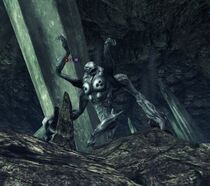
A 腔鸣猿
腔鸣猿 (Japanese: イムプレカ, Imupureka) are huge four-armed creatures in 异度神剑X. They can be considered counterparts to the 灵长猿.
Description
"Loners for the most part, 腔鸣猿 possess no 晴天 territorial boundaries. When the need arises, however, they can coordinate for group hunts by emitting an odd sound from their chest cavities. 交谈 standing in such situation is determined by the quality of tone produced."
"The exception to this loner rule involves children, as small groups are often formed for the sole purpose of rearing young. Baby 腔鸣猿 are soothed to 睡眠 by pleasant, lullaby-like sounds, the rhythm of which differs from group to group. Though they are a hermaphroditic species, breeding can be performed via asexual reproduction if a mate cannot be found."
Characteristics
腔鸣猿 have hairless, drab bodies. Much like simiuses, 腔鸣猿 have four muscled arms. 腔鸣猿 have a bump-covered face and four hollow spots where their eyes should be. Their larger arms have growths on the back of their hands. 腔鸣猿 also have a short, stubby tail.
腔鸣猿 act like simiuses for the most part; eating, sleeping, and wandering. Some 腔鸣猿, however, are fond of pretending to be statues, with the hollow clicks of their moving heads giving them away.
Color Variants
腔鸣猿 fall into two color variants:
- A primarily silver grayish variant which can drop a 腔鸣猿银齿
- A yellow-bumped bluish-skinned variant which can drop a 腔鸣猿金齿.
List of 腔鸣猿
| Name | Variant | Type | Location | Time | Weather | Level |
|---|---|---|---|---|---|---|
| 「洞穴」腔鸣猿 | Silver | Normal | 白树大陆 | Anytime nighttime (无情溪谷) |
All | 41 - 50 |
| 「奇骨」欧斯塔基奥 | Silver | 珍稀种 | 白树大陆 | nighttime | All | 43 |
| 「嘲笑」莱昂德罗 | Golden | 珍稀种 | 白树大陆 | Anytime | All | 49 |
| 「起源」腔鸣猿 | Silver | Normal | 忘却溪谷 | Anytime | All | 51 – 60 |
| 「遁士」腔鸣猿 | Golden | Normal | 白树大陆 | Anytime | All | 51 – 60 |
| 「峡谷」腔鸣猿 | Silver | Normal | 白树大陆 | nighttime | All | 31 - 40 |
| 「辉煌」腔鸣猿 | Golden | Normal | 黑钢大陆 | Anytime | All | 51 – 60 |
| 「狂暴」腔鸣猿 | Silver | Normal | 原初荒野 | 湖畔休假 | All | |
| 「爱琼」腔鸣猿 | Silver | Normal | 原初荒野 | During 湖畔休假, A route | All |
Etymology
腔鸣猿 means "singer", possibly referring to their vocal talents.





